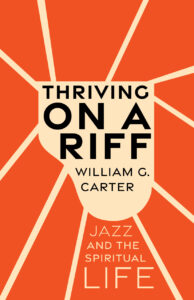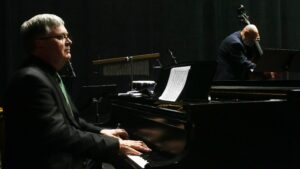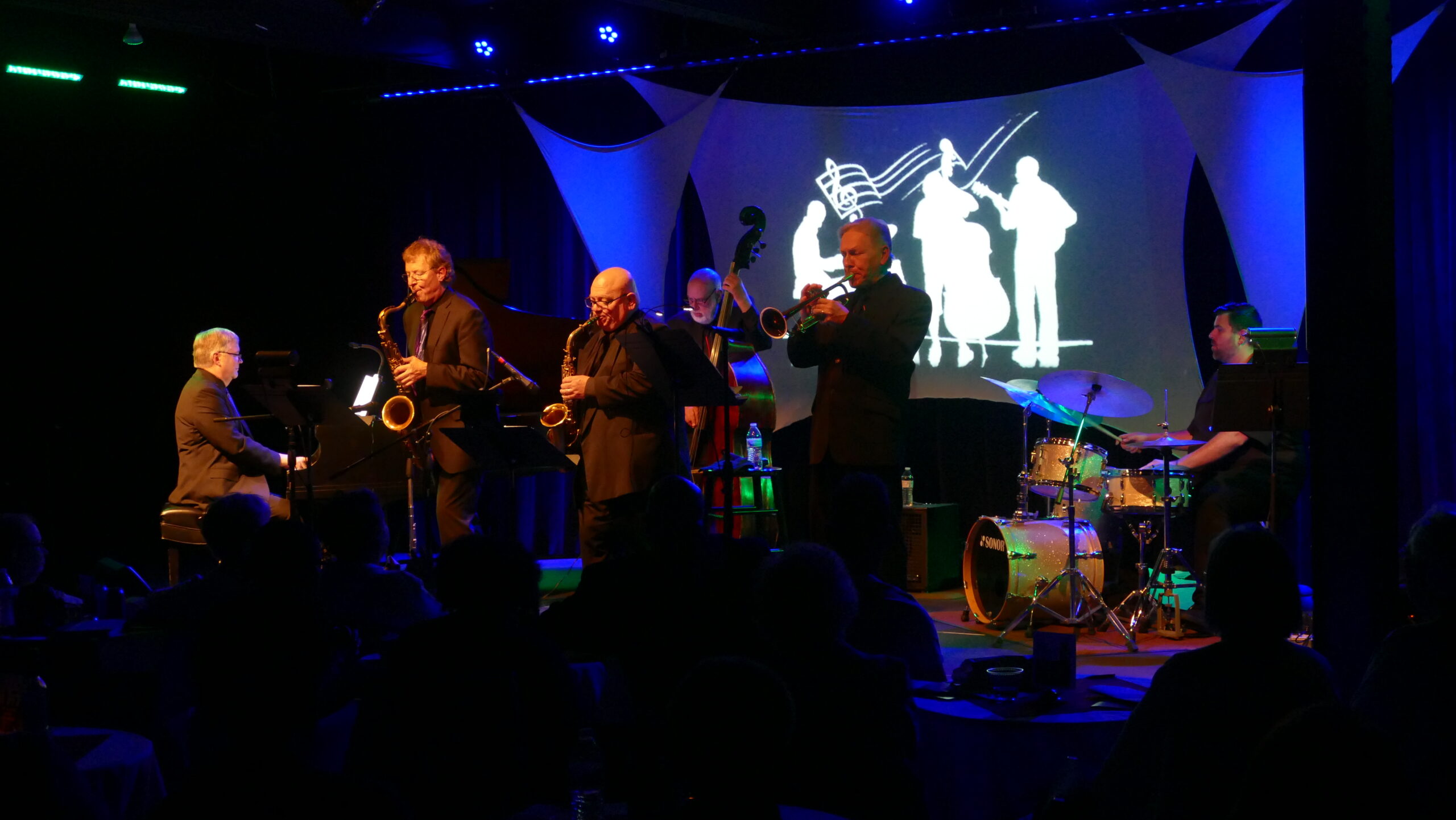Music has always been a major influence in the life of the Rev. Bill Carter as he grew up in Owego, NY. The family radio was constantly on in the house, greeting him with the sounds of the big band and swing eras of the mid-20th century.
“It was always kind of there,” Bill said, referring to the iconic sounds of Glenn Miller and Benny Goodman resonating daily through the stereo. “I can remember some moments of going to see a live performance and thinking, ‘Wow, I wish I could play music with these people, I wish I could play at that level.’ It resonated with my spirit very, very early.”
The members of the Carter family clearly had and continue to have a distinct love for music, and that passion didn’t get lost on Bill. The pastor at the First Presbyterian Church of Clarks Summit, PA, has been able to balance his call to the pulpit with a musical career with a jazz band named, appropriately enough, Presbybop. The four- to six-person group, depending on the day, performs on average 25 times a year, traveling as far south as Florida, and to date has released 11 albums on CD over its 30-year history.
Aside from being a pastor and a musician, Bill is also a writer. He’s had 11 books published, all of which he described as “sermon collections.” His 12th will be released April 23 and, in some ways, combines his three loves. Titled “Thriving on a Riff: Jazz and the Spiritual Life,” the book combines some jazz history and jazz theory with theology and spirituality.
“There’s so much that’s woven together,” Bill said of the 225-page book. “At the heart of it all, it holds together some of what it means to be human. To be human is to be vulnerable. To be human you have to process pain and search for joy. To be human you have to be able to work with other people. There’s kind of a sense of community in this. And there’s also something about being human, which Jesus is the incarnation of the Holy. So, what does it mean for the deep truth to become human right now in flesh?”
Bill, the pianist for the Presbybop ensembles, had plans of writing the book a few years earlier, but the covid pandemic delayed that schedule. In 2021, he spent his sabbatical in a mountain cabin as well as at a seaside cottage in Rhode Island, places that gave him the atmosphere he needed to produce the book.
“It’s a field report on what I’ve been discovering for the last 30 years about the integration of jazz and the spiritual life,” he said. “I began by playing some jazz in churches, particularly my own church, but also thinking about it spiritually and theologically and seeing where the pieces fit. I realized that nobody else was really doing this. They might have been writing about jazz to use it for something, but to think about the arts as a spiritual discipline and what kind of lessons can we distract and discover from that.”
The book begins with a story about his mother attending a Louis Armstrong concert in Oil City, PA, in 1955. What she saw there and relayed back to Bill had a lasting impact on him.
“Within 30 seconds, Armstrong was wiping his brow. He was so into it the perspiration was just pouring out of him,” Bill recalled his mother saying. “He was so deeply engaged. The second thing is that the room changed. I said, ‘What does that mean?’ She said, ‘Most everybody who enjoys music can sense the spiritual power but there’s no vocabulary.’”
 It’s a lead in to a discussion throughout the book and the dotted line between sacred and secular. There’s also a portion of the book that addresses things like the experience of community and the damage created by racism.
It’s a lead in to a discussion throughout the book and the dotted line between sacred and secular. There’s also a portion of the book that addresses things like the experience of community and the damage created by racism.
“I talk about harmony and the diversity of harmony. Sometimes there’s difference and conflict, and that can be intentional,” he said. “It’s where blue notes come from. I spend a lot of time talking about racism – the breaking of shalom that provokes and causes racism – but also the history that jazz musicians have taken on in confronting racism.”
Louis Armstrong, for instance, being a black entertainer in the 1950s, performed in many towns and cities where he was not able to spend the night. His story was one of perseverance – a musician who for a few hours was providing an uplifting performance only to be told he has to leave that same community and find lodging elsewhere because of his skin color.
“I tell a lot of stories about jazz musicians, from John Coltrane who had a spiritual illumination and it led him to give up hard substance abuse, to Jimmy Greene, a saxophonist with Harry Connick’s band whose daughter was slaughtered in the Sandy Hook gun violence episode,” he said. “I write about jazz musicians who were advocates for healing, how a diverse community is built out of creating music together and how not judgmental many jazz musicians are.”
Someone close to Bill’s heart is Vince Guaraldi, the famous Charlie Brown “Peanuts” composer who made history when he created and performed the first “Jazz Mass” in a cathedral worship service in the United States. At the time, jazz was considered “the devil’s music” by many religious conservatives, and the music had never been part of a church service. Bill and his Presbybop Quartet, along with two lead singers and the First Church choir, performed Vince Guaraldi’s historic “Jazz Mass” in Clark Summit in 2015.
“The book explores how jazz has been used in churches as a form of worship music,” Bill added.
The release date of the book of April 23 is not a random day. April is Jazz History Month, and the 23rd is International Jazz Day. Bill plans to do some book signings and talks in churches and bookstores, with some of those locations also hosting a jazz concert featuring Bill. Byron Borger, the owner of the Hearts & Minds Bookstore, provided lots of encouragement for the book, and Bill is leaning on the Dallastown, PA, outlet to be the preferred book seller for “Thriving on a Riff.” (Click here to read a review and purchase.)
“The book industry has changed so dramatically,” Bill said. “There’s a sense that if you don’t get a book from Amazon, then it’s not worth getting. In a time when bookstores are disappearing and publishers feel squeezed, I believe it is important to support the local booksellers that we know and trust.”
The book covers a lot of ground in terms of music and spirituality without a strong push toward religion. That might seem surprising given the title of the book and who the author is. Even though there’s no direct talk of those things in the book, they can still be found in the words and pages of it.
“I hope that readers get the sense of integration,” Bill said. “It’s more than my own personal story of integration of holding together these two explorations of jazz and spiritual life. It offers a model of integration for their own lives. It’s an integration of the arts and how the arts can nourish and direct their spiritual path.
“I don’t talk about religion because that’s narrow. I don’t talk specifically about faith because that’s an inclination of the heart. But the spiritual life is the life of the Spirit in us that must be lived. It’s more about here and now than about selling someone a vision of heaven. It doesn’t preach Jesus although it is very clear He is implicitly present in all that I write and I’m talking about.
“What I’m trying to get at is, what does it mean to live completely so that you’re perspiring by 30 seconds in and you’re working to lift the spirits of people in this crowded auditorium?”


